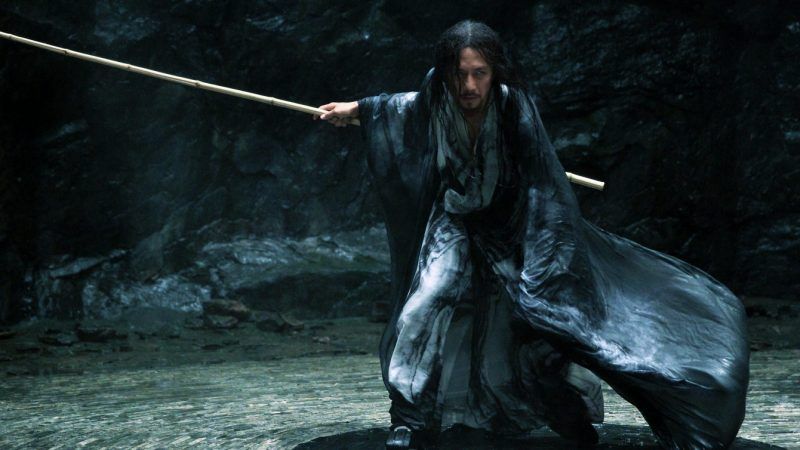Movie Review: Shadow
Zhang Yimou returns to the world of flying daggers.

Maybe you've never thought of umbrellas as deadly weapons. I never did. But take a look at the ones in the new Zhang Yimou movie Shadow, in which the usual rib-and-cloth umbrella assembly has been replaced with a canopy of long razory knives. At first I thought Zhang had to be making these babies up; but the internet tells me he wasn't, exactly. Kung-fu umbrella actually is a martial-arts thing, apparently, although the blades we see in the movie, which can be detached with the whip of an arm and sent flying toward an opponent, would appear to be a Zhangian embellishment—needless to say, a very cool one.
After being schooled in this matter, I decided to just accept some of the other retro-futuristic tech on display here—the arm-strapped crossbow gloves, the reed-based scuba gear. Why not? The movie is beautiful beyond the call of the wuxia action genre, and since the story at the heart of it unfolds at a pace that is, shall we say, deliberate, we'll take all the fantasy pep we can get.
The time is Long Ago. In the court of the Kingdom of Pei we meet a young monarch (Zheng Kai); his pretty sister (Guan Xiaotong); his handsome military commander, Yu (Deng Chao); and Yu's elegant wife (Sun Li). What we don't know, at first, is that Yu is a ringer—a body double, or "shadow," named Jing—who has been brought in by the real Yu (also played by Deng Chao) to take his place and thus conceal from the kingdom's enemies that its top general has been grievously wounded in battle. The real-deal Yu is hunkered down in a sort of cavern deep inside the royal palace, where a breeze-from-nowhere blows interestingly through his disheveled hair and he makes himself available to his wife and to the imposter Yu for fight training and military consultations. His martial expertise is especially important now that it's been decided something must be done about an enemy general named Yang (Hu Jun), who has occupied a nearby city, also called Jing, that the Kingdom of Pei has always liked to think of as its own.
What we have here is a kung-fu war story, a love story (more than one, actually), and a spy story, too (there's a mole in the royal court). As you'd expect from the director who once gave us such game-changing wuxia movies as Hero and House of Flying Daggers, Zhang also provides more fabulous imagery than can probably be taken in on just one viewing. He says he was inspired by the ancient Chinese art of ink-wash painting, and in pursuit of that watery esthetic, after shooting the movie in color, he proceeded to drain most of the color away, leaving behind only skin tones and gashes of red to punctuate the widescreen grayscale.
This is a formidable technical achievement, for which much credit must surely go to Zhang's customary cinematographer, Zhao Xiaoding, and to his production and costume designers (Ma Kwong Wing and Chen Minzheng, respectively). The blossom-printed rice-paper screens and ornately detailed armor would justify more leisurely appreciation; and some of the exterior textures—a bamboo forest, underwater harbor fortifications and rain that never stops pouring down—create a steely mood of the sort familiar from old Bible lithographs.
The action in this movie is not what you'd call nonstop. There's quite a bit of exposition at the beginning, and when the picture does kick into gear, there's not a lot of old-school wire fu to be seen (although what we do see of it is subtly executed). This is fine. Zhang stages some terrifically complex battle scenes featuring crowds of warriors all wielding blade umbrellas or sliding down wet village streets picking off locals with their miniature crossbows. The man's an action visionary.
He is also a man dedicated to finding higher purposes for female characters and actors. (This is the director who gave Gong Li and Zhang Ziyi their first film roles.) Here, he has not only created a gratifying vengeance arc for Guan Xiaotong's angry princess (who holds a serious grudge against a clueless prince who tried to purchase her for a concubine), but has also given her one of the great zither-duet scenes (okay, sounds weird—you have to see it). Sun Li's conflicted wife, increasingly torn between two versions of her husband, is a more passive figure—more hemmed-in by tradition. But it's her unique style of fighting (the umbrella school, I guess it could be called), that wins the day at the end. Well, more or less—the story, too, is told in shades of gray.


Show Comments (8)